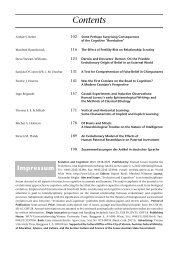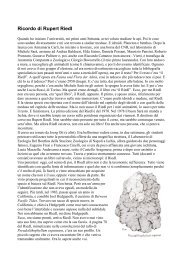The Seven Sins of Evolutionary Psychology - Konrad Lorenz Institute
The Seven Sins of Evolutionary Psychology - Konrad Lorenz Institute
The Seven Sins of Evolutionary Psychology - Konrad Lorenz Institute
Create successful ePaper yourself
Turn your PDF publications into a flip-book with our unique Google optimized e-Paper software.
Jaak Panksepp and Jules B. Pankseppassert that simple emotional systems with a modicum<strong>of</strong> some general-purpose cognitive skill, mayeasily yield some <strong>of</strong> the most striking folk-psychologicaldiscoveries <strong>of</strong> evolutionary psychology.Yes, childless, rouge males are more likely to harmthe young whereas fathers and especially mothersare much less likely to do so, especially to their own(DALY/WILSON 1988). Could this simply reflect theprimitive social-bonding mechanisms <strong>of</strong> the mammalianbrain that promote anti-aggressive attitudesby arousing ‘peace-promoting’ neurochemical activitiesin ancient neural systems? One <strong>of</strong> the mostspectacular findings in this area is the discovery thata single sexual episode can gradually transform infanticidalmales into tolerant ones, so that they areleast likely to kill young at the time their own <strong>of</strong>fspringenter the world (MENNELLA/MOLTZ 1988). Weanticipate that when investigators probe such matters,they will find that satisfying sexual activitiesarouse the chemistries for nurturant feelings in thehuman brain, just as they do in other animals(CARTER/LEDERHENDLER/KIRKPATRICK 1997).We have no problems with the idea that evolutionarily-derived,socio–sexual adaptations existwithin our mind/brain dynamics, we simply questionthe wisdom <strong>of</strong> conceptualizing these processesas evolved, cortico–cognitive ‘modules’. At the sametime, we do agree with carefully analyzing how humancognitive activities change as a function <strong>of</strong> suchaffective changes (which will eventually be capable<strong>of</strong> being precisely manipulated in humans viaknowledge derived from the study <strong>of</strong> the corresponding,emotion-modulating chemistries in animalmodels). <strong>The</strong>re are other interesting emotionalexamples to consider from the vantage <strong>of</strong> the principle<strong>of</strong> a cross-species parsimony (PANKSEPP 1998a).We certainly believe that such ancient emotional dynamicsare bound to have remarkably strong effectson the cognitive dynamics <strong>of</strong> human minds. However,the study <strong>of</strong> such processes will require development<strong>of</strong> a more vigorous, empirically deep psychology(PANKSEPP 1999; SOLMS/NERSESSIAN 1999).Group SelectionIn the initial paper, we chose to leave a variety <strong>of</strong> ourarguments open-ended, so we could attract pointedcriticism about issues about which we all truly knowvery little. <strong>The</strong> most poignant example was our willingnessto consider a viewpoint that is viewed as ananathema by most evolutionists. Namely, the concept<strong>of</strong> group selection. In truth, we are quite agnosticon this issue and simply urge our colleagues to bemuch more open-minded on the topic than manyhave typically been. First, let us be unambiguous oncertain issues. We certainly agree that evolutionprogresses as a function <strong>of</strong> the survival <strong>of</strong> gene patterns.<strong>The</strong> functional unit <strong>of</strong> selection must be theindividual that carries genes and at least in ‘higher’animals, that negotiates (typically emotionally)with other members <strong>of</strong> a species to pass on its genes.In such interactions, affect may be the main currency<strong>of</strong> decision making and behavioral choice.Thus, it would seem essential to consider the role <strong>of</strong>emotions, especially those emerging from dyadicinteractions, as a fundamental source <strong>of</strong> evolutionaryprogression in our species and many others. Inshort, our introduction <strong>of</strong> a variant <strong>of</strong> the groupselection concept is only tangentially related to theclassic concept.In its historical meaning, group selection wasposed and modeled as a possible explanation <strong>of</strong> whyindividuals in social groupings may behave in a waythat is overtly suggestive <strong>of</strong> altruism. WYNN-ED-WARDS (1962) postulated that individuals may concedetheir own opportunity to pass on their owngenetic guideline, by opting to contribute time andresources to other members <strong>of</strong> the group to which itbelonged—a contribution that would facilitatepropagation <strong>of</strong> the species. Soon after, HAMILTON(1964) argued that seemingly altruistic acts could beexplained by the concept <strong>of</strong> inclusive fitness. In thisway, individuals would only help out a group memberto the degree that the cost <strong>of</strong> a specific ‘generous’act was less than the genetic passage to be gained(i.e., the degree <strong>of</strong> genetic-relatedness should be apredictor <strong>of</strong> the extent to which an individual willbe altruistic). From this vantage, altruism could beexplained in terms <strong>of</strong> the genetic success <strong>of</strong> individuals,and the potential benefits <strong>of</strong> reciprocity.What remains a moot and <strong>of</strong>ten an acrimoniouspoint is whether gregarious animals act altruisticallywhen there is negligible genetic gain at stake. In ourprevious paper, we opined that certain affective/behavioralfunctions could only propagate within aweb <strong>of</strong> group dynamics. Indeed, if these processesonly occur when individuals are genetically related,they certainly can be reduced to selection at the level<strong>of</strong> the individual. However, if some can also operatestrongly between genetically-unrelated individuals(e.g., arising perhaps from pair bonding and othersocial coalitions) then one can imagine, for instance,dyadic selection (a minimalist form <strong>of</strong> group selection)to be an influential force in evolution. Eitherway, we feel that this process is substantially differentand thus deserving <strong>of</strong> its own distinction whenEvolution and Cognition ❘ 74 ❘ 2001, Vol. 7, No. 1








